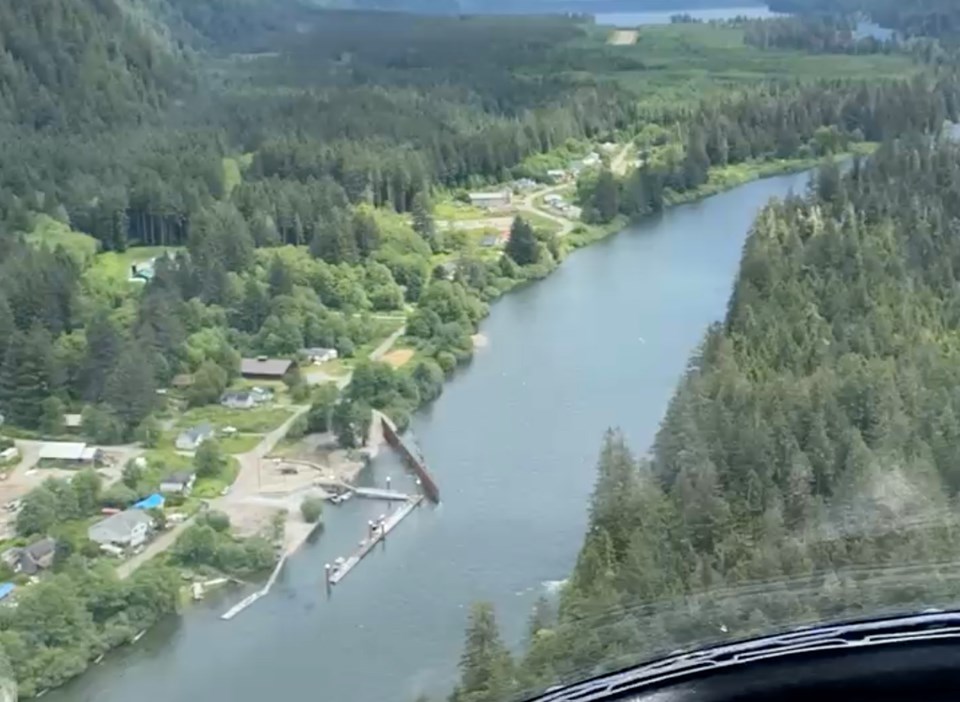A helicopter company that transports a Port McNeill doctor into a remote First Nations community stopped service this month due to an unpaid $75,000 bill.
Peter Barratt, 75, co-owner of West Coast Helicopters, started transporting doctors into the First Nations communities of Kingcome Inlet, Kyuquot and Wuikinuxv about 44 years ago. When payments for the flights into Wuikinuxv Nation on Rivers Inlet dried up in February, Barratt called the doctor.
“I said, ‘I don’t know how long we can keep going with this,’ ” said Barratt, recalling his conversation with Dr. Prean Armogam.
Armogam, who fully supports the helicopter company, said there are two infants — including one who was in hospital for months — with young mothers in Wuikinuxv Nation who need hands-on care. There is support from family and the community, of course, but there are no nurses in the community, he said.
He was scheduled to fly on July 7. “I needed to physically see that baby and I didn’t this past week,” said Armogam, who has provided health care to the people of Wuikinuxv Nation for 16 years.
Historically, Island Health paid for doctors’ flights into all three communities, but more recently the province has been paying for those to Kyuquot, with the First Nations Health Authority paying for Kingcome Inlet and Wuikinuxv.
Kingcome Inlet and Kyuquot are within Island Health’s service area. Wuikinuxv is within the Vancouver Coastal Health Authority, but residents access medical care on Vancouver Island.
Since Barratt brought the problem to Armogam, there has been lots of correspondence with the First Nations Health Authority and others, but no resolution.
“I blame the First Nations Health Authority, I blame Vancouver Island Health Authority, and I blame Vancouver Coastal Health Authority because none of the three of them are owning this orphaned First Nations community,” Armogam said. “None of these three organizations were able to figure out how to actually get the service running.”
Island Health said Friday the Wuikinuxv Nation is not in its service area. “Island Health is not the primary organization that co-ordinates this particular physician service,” said the health authority. “Vancouver Coastal and FNHA will need some time to look into this.”
On Saturday, the First Nations Health Authority said it would look into the situation on Monday, when the appropriate people were available.
Barratt said he’s not cutting off service because his team doesn’t want to fly up there, “we’re cutting it off because we can’t afford to fly up there.”
“These things aren’t cheap to run,” he said. “I’m telling you, our profit margins are about two per cent, maybe.”
He said one doctor flies from Port Alice to Kyuquot, two doctors fly from Alert Bay to Kingcome Inlet, and Armogam flies from Port McNeill into Wuikinuxv. “Between the three of them, they owe us $75,000 bucks.”
Barratt said $49,000 of that has been overdue for months. “I don’t know which one’s paying … it sounds like they are fighting amongst themselves. It sounds like they are changing the billing. We don’t know what’s going on.”
Dr. Granger Avery, 76, a retired physician and former president of the B.C. Medical Association, arrived in Port McNeill in 1974.
“It became very apparent to me after two or three years that people were arriving from the more remote communities with stuff that they should have had addressed way earlier,” Avery said Saturday. Given the difficulty of travelling from these areas, he quickly decided he had to go to them.
He approached Indigenous Services Canada, which agreed to pay for the flights.
Avery said the hands-on care physicians provide in the remote communities is vital for both patients and physicians — seeing the patient’s pallor, feeling a patient’s weak pulse or hands, seeing the way they speak, or seeing them in their home environment is all necessary.
“There are signs an experienced GP will pick up on and think about and sometimes it’s important and sometimes it’s nothing — but unless you are there, you can’t do that,” he said.
Tribal manager Paul Willie said the chief and council plan to talk about the ongoing struggles to get adequate medical care in the community.




